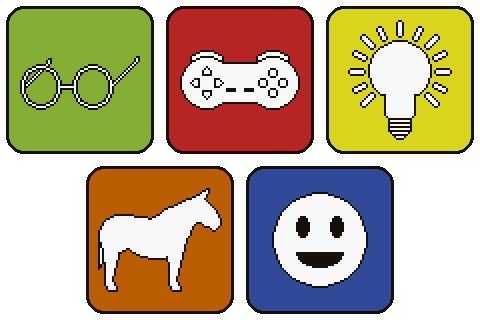A Field Guide to Game-Development Discord Inhabitants
In their natural habitat!
In a given game-development Discord, whether focused on an engine, a genre, or something else, certain “types” of inhabitants tend to emerge. Let us study five of them in their natural habitat.
The Expert knows just about everything that seems to be knowable about their designated areas—such as a style of art, or music, or programming language, whether common or obscure.
Experts are valuable resources in their subjects; but should take care not to over-correct others or become snarky or cynical. With appropriate humility they are nothing short of awesome in any community.
The Gamer isn’t there primarily to make games. They’re there to play. The Gamer can provide knowledgeable conversation about the art of games, helping answer questions like “has this been done before?” out of their vast knowledge, or serve as an experienced play-tester. The worst danger is that if the Gamer has development dreams of their own, they might get lost in the “consumer” side of the hobby and lose that dream.
The Idea-Haver wants to make something amazing and has the fresh new mechanical and narrative ideas to do it. What they might not have is a notion of how to easily implement the ideas. Idea-Havers by nature risk becoming dreamers, stuck in the abstract realm of hypotheticals. But once they get their feet wet in the process of development, and see their ideas realized, they can become forces to be reckoned with.
The Workhorse is the person you can trust to get a job done. They’re the teammates there for that last 24-hour crunch, the ones you trust to produce bulk of your code, or tile-sets, or music. The Workhorse can serve as a massive inspiration for others, but should be cautious not to over-work themselves, or become too perfectionist or controlling in their domain, with themselves or others—each of which in turn feeds back into crunch.
The Conversationalist is the one who really just wants to build community and have a fun conversation. They’re the ones asking about your projects or how your day is, lending an ear on a technical or personal trouble, or bantering over memes. Of course, with great talkativeness comes great responsibility—and The Conversationalist can influence a community’s vibes for good or ill.
In all likelihood the reader will see some of themselves in each of these types. But this being the internet, we can’t have nuance. So tag yourself in the comments or on Twitter or whatnot:
And if you’ve found this post entertaining, please do:
Note: As I feel this post owes something to Derek Yu’s Indie Archetypes, and it’s a good read in itself, I recommend it for further reading.
Also Nathan Nestor comes through with a typo correction as so often happens :)






